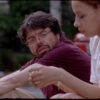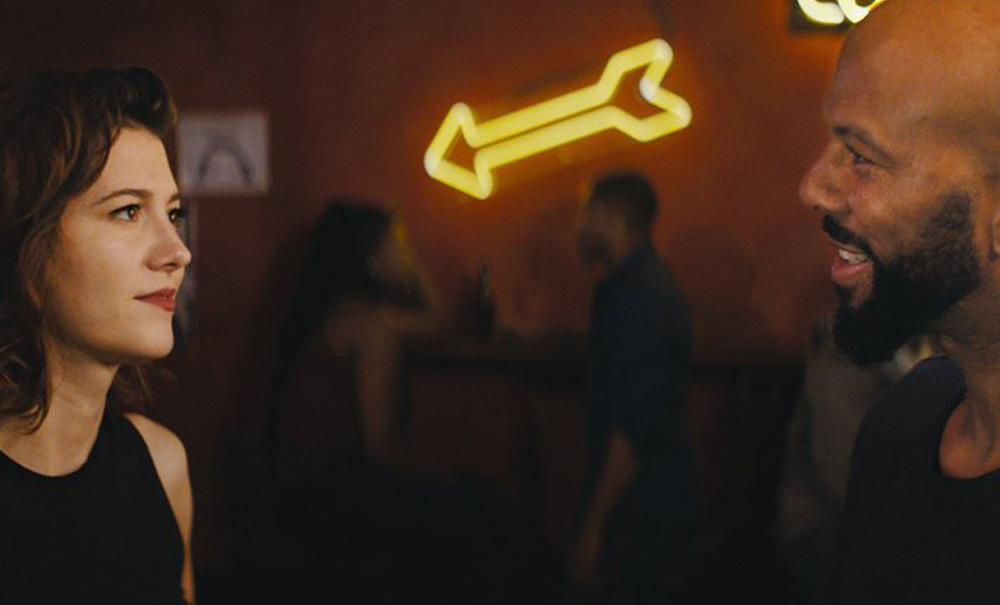When Eva Vives in the editing room last fall working on her feature directorial debut “All About Nina,” she was debating to include a reference to Louis C.K. in a stand-up set performed by her heroine Nina Geld (a ferocious Mary Elizabeth Winstead), in which she takes aim at her fellow comic’s then-rumored sexual misconduct towards women. The writer/director had heard stories from people in the comedy scene for years, yet when those stories finally made it onto the front page of the New York Times as part of the wave of women coming forward with their experiences with predatory men in show business and elsewhere, she no longer knew if the name check was necessary.
“I thought [we were] outing Louis C.K.,” Vives said, shortly before the premiere of “All About Nina” at the Tribeca Film Festival, where it was preceded by a Time’s Up PSA, as every other film at the festival has been. “I took it out because I was like, ‘Well, now everybody knows.'”
Besides avoiding redundancy, the additional benefit of trimming the line is that it leaves more time to let the spotlight shine on Nina, which is where it belongs. A force of nature who disarms audiences in her stand-up set with frank discussion of having her period while on stage and boasting a killer set of celebrity impressions, she is angling for a gig on “Comedy Prime,” a network sketch comedy show, when she relocates from New York to Los Angeles in Vives’ feature. But that isn’t all she’s moving away from, escaping an abusive ex (Chace Crawford) and a host of other improper relationships that have become fuel for her brash act, but prevent her from trusting anyone enough to have a relationship that lasts longer than a one-night stand.
While Vives is excited to see what happens when Nina is presented with a seemingly stand-up guy, no pun intended, in Rafe (Common), a contractor she meets at one of her shows, she is equally interested in how Nina uses her art to protect herself, not only from others as she’s empowered by being able to cut anyone down to size with a wicked one-liner but also from having to truly investigate the source of her pain since she can tell herself she confronts her demons on stage every night. The film cuts deep, both in its incisive wit and its fully realized portrait of a woman who finds that for as much bravery as it takes to entertain strangers every night with jokes derived from her pain, it takes as much courage to gain acceptance with an audience of one – and the only one that matters. While “All About Nina” was making its premiere at the Tribeca Film Festival, Vives spoke about making a film that’s time has obviously come, working with Winstead on creating such an indelible character and getting serious about comedy.
How did this come about?
Two days ago I was like, “You spent so many years pushing everything and trying to get it made,” and then two days ago I was like, “What did I do?” [laughs] It’s been a long time coming. It’s a story that I’ve been wanting to tell for a long time in one way or another, and the way I’ve been talking about it is to say that it’s very much my story except for the fact that I never did stand up. I’m not a comedian, but a lot of the personal stuff is mine. The hardest thing was for me to figure out what she did professionally because I really wanted her to be creative and show what women doing that and doing it well, hopefully, but it’s hard to do that visually with a writer. It’s not that interesting, just sitting there and thinking about stuff.
About three years ago, it just crystallized [because] I always loved comedy so much and it’s something that I followed very closely for many years. I always loved reading it and going to see it and there is the element of writing, but there’s performance and connection with the audience. Once I thought “Oh, she should be a comedian,” it came fairly quickly.
Since the film has several of Nina’s stand-up routines peppered in, is that interesting to play with structurally since you can have that direct confessional moment as a release valve for the rest of the story you’re telling?
Writing worked great because it really helped me show the difference between who she presents to be on stage, and then what’s really going on in her life, which is one of the things I really wanted to do. Obviously, when I wrote this, #MeToo hadn’t happened yet, but at the time, I really wanted to have people think about the fact that the girl cashier at the supermarket maybe was just hit [by an abusive man in her life] the night before, or the stewardess working on the airplane, or your doctor, or whomever you encounter. They might be a survivor or a rape victim, and we don’t really think about that day to day unless we’ve been through it ourselves.
[But at the same time] it would shine a light on this issue, [I wanted it to] be hopeful for survivors, that in the end [Nina] goes through all the stuff but she’s okay, and she has her career and she can have a relationship because often, rape victims or sexual abuse survivors in movies or TV are shown as committing suicide, and sadly that is very true for a lot of us, [so I don’t say that] to minimize in any way the impact of that. But there’s also a lot of us that go to therapy and do the work and get support, which is really important and are able to somewhat have the lives that we want just like anybody else who hasn’t been through it.How do you find the right Nina, and when it’s such a central role, what’s that collaboration like with Mary Elizabeth Winstead to create this character?
It was great. I mean, what a cast to have for a first film especially. And I love their acting, but [Mary and Common] are also the two of the nicest people. I got so lucky with Mary in particular, because I was a little worried that it’s a punishing part in many ways and I don’t think she looked at it that way – because she’s insane, and I mean that in a good way [laughs] – but she makes it look so easy. I remember one day I looked at the schedule and it was the [scene where] she met Rafe, [a different scene where she] made out with that dude in the closet, and [another where she] fucked Mike on the same day. Plus, she did a [standup] routine and some other thing. I was like, “Oh, my god. How does she do this?”
It’s very intense to be playing Nina. There’s a lot of funny stuff in it – and she obviously does comedy and can make people laugh, but then there’s also drama. And she dances. There’s a sex scene. It’s just endless. Mostly, we talked about it a lot. [Mary’s] not big into rehearsing, and I can go either way, so we talked about who she is and where she was coming from and what was happening in each scene and the parts we did rehearse were the stand up, which I think was the part that worried her the most although I knew she was going to be totally fine. It was just a question of getting her comfortable and in the rhythm. Together and separately, we watched a lot of comedy, we went to shows and I’m very familiar with the comedy scene, more New York than in LA because I used to be in it, and we had a great comedy consultant in the movie, Jamie Loftus, who is a young comedian who was integral in this because it was her and I, and Mary sometimes, adding jokes and taking it further. Jay Mohr was helpful as well. We just ran our routines past him and took notes.
Did you know when you cast her she had a great Celine Dion in her back pocket?
I’m so glad you asked about that because that was the part that worried me the most. I’m not really that kind of writer. The stand-up came easily to me because she’s a comedian that is a storyteller. She’s not really doing like set-up [then] punchline, which I can’t really do, but I thought, “Oh my god, how I’m going to do this stuff?” But Mary is a singer, so once I knew that, I leaned into that a little bit because I thought, “Great! She can sing!” Which not everybody can and one day with Jamie, Mary, and myself, we just spit ball [an entire routine of impressions] and let everything come in. We watched a lot of videos. Shakira, that was a funny one because the joke with her is that nobody ever really understands what she’s saying, and she’s always so happy. I came up with the idea of having it all being this smoothie shop so that the set up is always the same [that various celebrities walk in and show their personalities through their drink orders] and you get it. Obviously, I show my hand [as a movie buff] because [we include] Werner Herzog. I just love him. Who doesn’t love the way he talks? It’s so much fun to write that stuff. I listened to his interviews and was like, “What would he put in a smoothie?”
Arguably the centerpiece of the film is this date that goes into the wee hours with Rafe and Nina fighting against their instincts, trying not to have sex so soon into their relationship. Since it covers the entire gamut of emotions, what was it like to shoot that?
It’s one of my favorite parts of the movie, and one of my favorite parts to have shot because it just felt so good. I think we were in [Rafe’s] house for four days and [the actors] were so wonderful. A lot of it for me as the director was setting the mood and keeping the mood because it can be hard sometimes if you leave and then you come back one day. We listened to a lot of music. Both of them are so musical and I am too, so we played mostly music that we thought Rafe would listen to and [we had the backstory that] he was in this band, so there’s a lot of The Growlers, [who plays] the song that he dances to. I love the intimacy of it, so [setting the mood] was more about just keeping it fun and light and then also having her open up and tell him [some] stuff.
What was it like to set the tone visually? It’s very playful, like when for instance in the scene mentioned above you’ll change perspectives by flipping the frame upside down and back as Rafe and Nina are lying on the floor, but you also keep the backgrounds so lively throughout.
Yeah, it’s not always an easy thing to do on a low budget, but I give credit to Thomas Scott Stanton, the [cinematographer], and Kelly Fallon, the production designer, who’s super young and so bright. All three of us talked a lot together and separately about embedding a look into the film because we didn’t necessarily have a ton of money to shoot as much as we would have liked to using light [set-ups] and all that stuff. But for example, that wallpaper in [Nina’s] apartment in New York was one way [of] thinking about it from a character point of view. I thought Nina isn’t somebody who spends a lot of time decorating her place, but I could also see her [saying to herself], “I’m fucking wallpapering this wall,” and doing that with a really bright thing. So you build that into the movie.
In terms of the look and color scheme, and all that stuff, I’m a big fan of Cassavetes and I love a lot of the darkness in his films and also a lot of the red. There’s a lot of red in this movie, which I thought was [Nina’s] color, and once you know that, you keep finding ways of putting it in and by contrast, [Common’s] house is very brown and blue and very manly [suggesting] who he might be. You just find ways of supporting each of their characters.
When directing your first feature, what was your first day like on set after waiting for this moment?
It was great, and it was nervewracking. I couldn’t believe that it was finally happening because pre-production is so intense and you’re thinking about so much stuff. But our first day was Nina and her mother [played by] Camryn Manheim, who [actually] had done that role and [the role of the] the therapist, which used to be a much bigger role, for a reading that we did of the script a month before, and I always loved Camryn Manheim, so it was a relatively “easy thing” to get into and it was a lot of fun. Actually, It turns out Camryn and Mindy Sterling, who plays the nosy neighbor, know each other in real life and they were just so fun that I was like, I want to make a movie about the two of them now.
It was also interesting to see so many women [on set]. It was very supportive. Even though it’s such a female film, I hadn’t really thought about what that would feel like to have that much female energy around. When they start talking at the entrance, I was like, “Wow. That’s a lot of female voices,” but it was great and definitely a dream come true. I had an incredible experience shooting this. I’m so grateful for everybody who worked on it.
You may have answered earlier, but since you mentioned #MeToo, did your ideas about the movie change after it was already in the can or you were editing it? I imagine post-production coincided with the reckoning last fall.
I have so many feelings about it. I was in the middle of editing and my husband actually texted me the New York Times article about Harvey [Weinstein], and I can’t stress enough how seismic of a change it is in every way. It’s something that I’ve been talking about for many years privately and publicly — I don’t mean in the way Nina does it, but I am open about what happened to me in my own life. I’ve worked a lot of survivors and I hear this stuff all the time, so I knew it was there and to have it be acknowledged the way that it is now — and again, I still think we have a lot of work to do — but it’s pretty incredible.
It’s also sad. I know other [people] have said this too, but it’s been a very triggering few months, and very validating. I applaud everyone that’s coming out and I think it’s about time. But it was not easy either. It was tough in the edit room to keep going every day and to keep hearing all of this and I’m hoping right now the timing of it is that the film is seen as more relevant whereas before when I was writing it I was hoping that it just would shed a little bit of light on what that was like. Now it feels like there’s so much discussion about it that hopefully it’ll work.
“All About Nina” opens on September 28th.





Comments 1